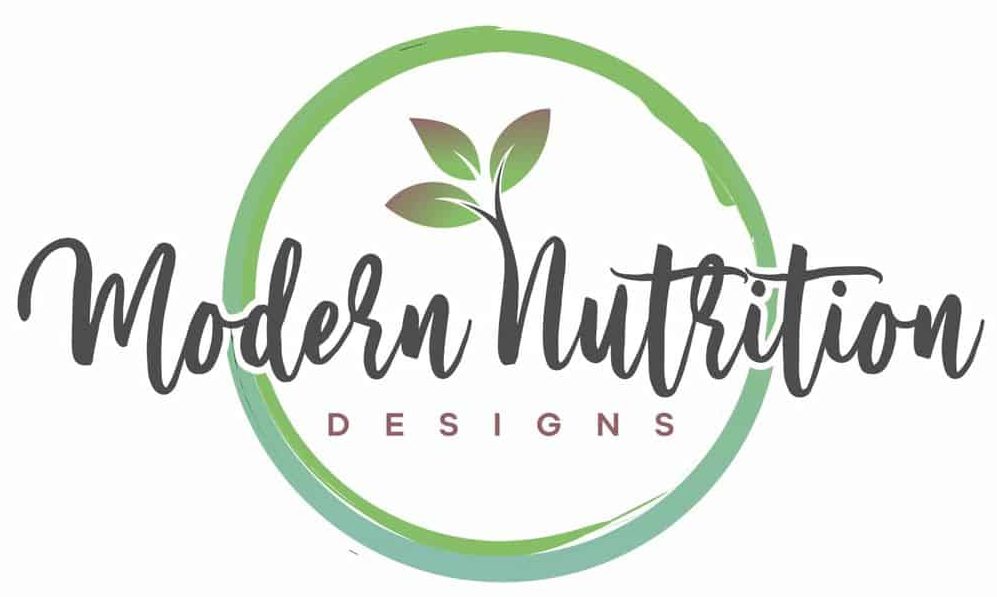More people are beginning to recognize the profound connection between the foods they eat and their ability to combat disease. After studying nutrition for many years and converting to a whole foods vegan diet, I can personally appreciate the link between wholesome plant foods and the benefits it poses on immunity.
There are simple changes you can make to your diet right now to reduce your susceptibility to infectious diseases and viruses, such as eating more whole plant foods regularly. Foods like fruits and veggies contain important phytochemicals, micronutrients, and antioxidants that have a critical influence over the functionality of the immune system.
Foods like garlic, berries, beets, leafy greens, ginger, and turmeric reduce inflammation, relieve oxidative stress, and provide important essential micronutrients for carrying out regular processes inside the body.
Studies reveal how a higher consumption of these foods may result in less frequent infections, lower severity and duration of colds and viruses, and an overall more robust immune system.
Nutrients that support immune health
According to the Cleaveland Clinic, the following nutrients are needed in adequate amounts to carry out proper immune function:
- Vitamin C
- Vitamin E
- Vitamin A
- Vitamin D
- Folate/folic acid
- Iron
- Selenium
- Zinc
Immune-boosting plant foods
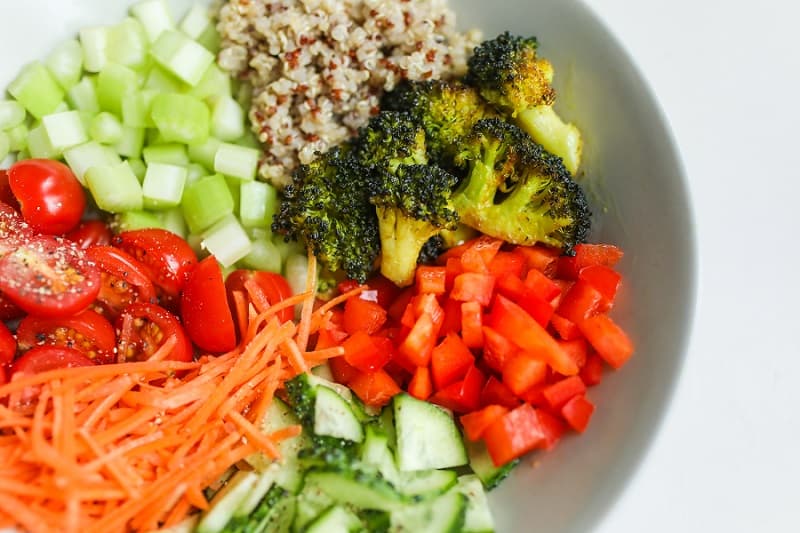
There are many delicious tasting plant foods that provide a number of these health-promoting nutrients. Here are some examples:
Plant foods high in vitamin C
- blackberries
- Brussels sprouts
- broccoli
- citrus fruits
- green peas
- leafy greens
- sweet potatoes
- raspberries
- red peppers
- tomatoes
- cabbage
- kiwi
- pineapple
Function of vitamin C in the immune system
Vitamin C has been long toted as the flu-fighting vitamin. People are quick to mix their powdered vitamin C packet into their drink around flu season.
Whole food alternatives that contain high amounts of vitamin C have been shown to be much more effective.
This vitamin is also more helpful to your immune system when provided regularly, as opposed to doubling up on it after the first signs of sickness appear.
Vitamin C is high in antioxidants that protect against oxidative damage in the body. When the body’s supply of antioxidants is low it becomes more vulnerable to damage, disease, and aging.
Vitamin C also supports immune function by boosting its ability to resist infection under stressful conditions.
This vitamin drastically improves the absorption of iron, which is another immune supporting nutrient.
Eat plenty of citrus fruits, leafy greens, and sweet potatoes to obtain your body’s daily vitamin C requirements.
Plant foods high in vitamin E
- avocados
- broccoli
- carrots
- leafy green veggies
- nuts
- seeds
- whole grains
- wheat germ
- kiwi
- peanuts
- unrefined vegetable oils
Function of vitamin E in the immune system
Vitamin E plays an important role in the prevention of many diseases. It protects vitamin A and polyunsaturated fatty acids.
Low intakes have been linked to higher rates of cataracts, cardiovascular disease, and other harmful conditions.
This vitamin is also significant for its high antioxidant profile. Antioxidants are critical for maintaining a healthy immune system.
This particular antioxidant protects fat molecules from free radical damage. Fat molecules are used in cell membranes to provide various transport functions and structure.
Vitamin E stabilizes their membranes and prevents breakdown by harmful free radical species.
Plant foods high in vitamin A
- carrots
- apricots
- cantaloupe
- sweet potatoes
- tomatoes
- mango
- nectarines
- squash
- pumpkin
- broccoli
- leafy greens
- prunes
- turnips
Function of vitamin A in the immune system
Vitamin A is another antioxidant-rich nutrient that helps to maintain a strong immune system by reducing oxidative stress on the body’s delicate cells and tissues.
This nutrient is required to build and preserve the integrity of the skin and mucous membranes to protect the body against foreign invaders such as bacteria and viruses.
The skin is the body’s first line of defense against the environment. By compromising its integrity you are inevitably compromising your body’s defense against infectious disease.
Vitamin A has also proven to be a protective component in deadly disorders such as cancer and heart disease due to its diverse antioxidant profile.
Cooking allows for increased absorption of some carotenoids (the substance required to form a usable version of vitamin A in the body). Juicing also may increase absorption of this vitamin.
Plant foods high in vitamin D
- mushrooms
- fortified nondairy milk
- fortified juices
- fortified breakfast cereals
Function of vitamin D in the immune system
Vitamin D controls the growth and maturation of cells, such as those in bones, the heart, pancreas, brain, thyroid, and the immune system.
It helps to fight infectious diseases and reduce the risk of many chronic illnesses, such as multiple sclerosis, Chron’s disease, Type 1 and Type 2 diabetes.
Vitamin D also improves immune response by assisting in the regulation of blood pressure which reduces the risk of cardiovascular diseases and stroke.
I am sure many of you are aware that vitamin D is the sunshine hormone. Our bodies are able to generate this molecule after receiving 10-20 minutes of direct sunlight on our skin between the hours of 10 am and 3 pm in most latitudes during the warmer months of the year.
Most of us, however, do not have the luxury of living in a climate that provides ample direct sunlight year-round. In such cases it is helpful to take a vitamin D supplement to ensure adequate consumption of this vitamin if you are going the vegan route.
Currently, 15 mcg or 600 IU of daily vitamin D supplementation is recommended. This amount may vary depending on the stage of life you are in, and whether or not you are pregnant, or breastfeeding,
Plant foods high in folate
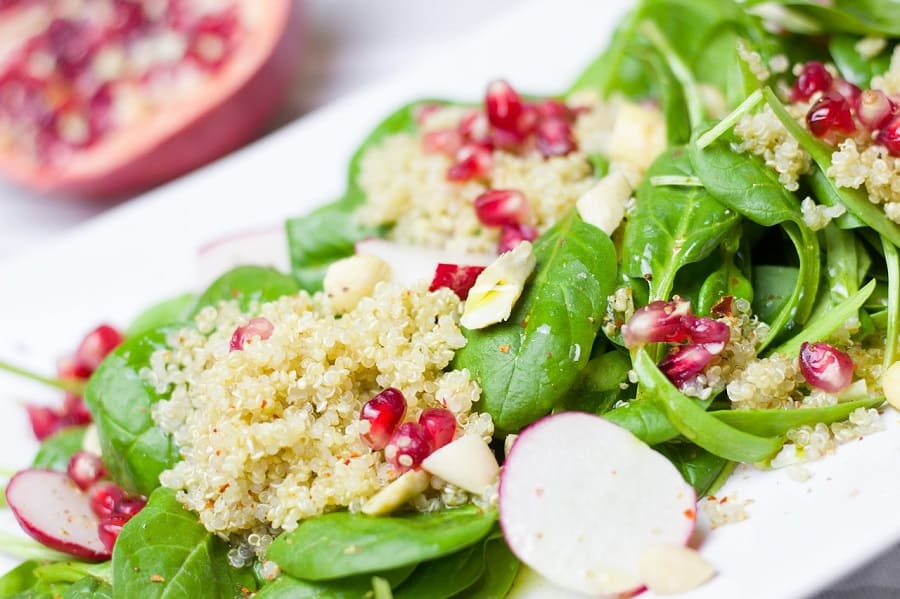
- greens
- oranges
- avocados
- almonds
- beets
- asparagus
- kiwi
- kelp
- cashews
- quinoa
- sunflower seeds
- yeast
- beans
- peas
- lentils
Function of folate in the immune system
Folate has several functions throughout the body, such a s removing excess build-up of homocysteine, building DNA and amino acids, and synthesizing SAM (s-adenosyl-methionine). It also helps support fertility in both genders.
Immunity is especially impacted by folate due to its role in building and repairing DNA and protein molecules. Deficiencies of this vitamin may lead to neural tube defects in the developing fetus, which ultimately develops into the brain and spinal cord.
Doctors recommend taking folic acid supplements to ensure folate deficiencies do not occur during pregnancy. This may not be 100% accurate, however.
There seems to be a large discrepancy between the response the body has to folate, the natural vitamin, and folic acid, which is the synthetic version.
Folate is found abundant in green leafy vegetables, as well as other plant foods. So to ensure you are obtaining adequate amounts of this immune-boosting vitamin simply eat a large colorful salad everyday.
Plant foods high in iron
- lentils
- soybeans
- tofu
- oatmeal
- pumpkin seeds
- dark chocolate
- blackstrap molasses
- currants
- dried figs
- dried coconut
- raisins
- asparagus
- avocado
- basil
- bok choy
- Brussels sprouts
- garlic
- peas
- artichoke
- dandelion greens
Function of iron in the immune system
Iron helps to transport oxygen throughout the body. It also scoops up metabolic waste, such as carbon dioxide when exchanging oxygen inside cells.
Iron is a key component in immune system functioning, as well as with the production of cellular energy, detoxification, and specific mental processes. All of which are involved in creating a healthy functional body.
Even though iron is recycled to some extent by our bodies, small amounts off iron are lost by the sloughing off of skin cells and the lining of the small intestine.
Women who experience regular menstrual periods and those who are pregnant are at particularly high risk for iron deficiency.
It is important to obtain iron from dietary sources as much as possible before relying on the use of iron supplements. These may come with side effects such as constipation, stomach upset and pain, nausea, and vomiting.
The current recommendations for dietary iron intake ranges dramatically depending on your current stage of life, whether you are pregnant/nursing/menstruating, etc.
Ask your doctor for specifics on your recommended daily intake of iron and whether or not you should consider temporary supplementation prior to implementing the iron-rich plant foods listed above into your diet.
For a full comparison between the iron obtained from animal dietary sources and that obtained by iron-rich plant sources please click the link to read my earlier article titled Why a Plant-based Diet is Healthier Than Eating Meat.
Plant foods high in selenium
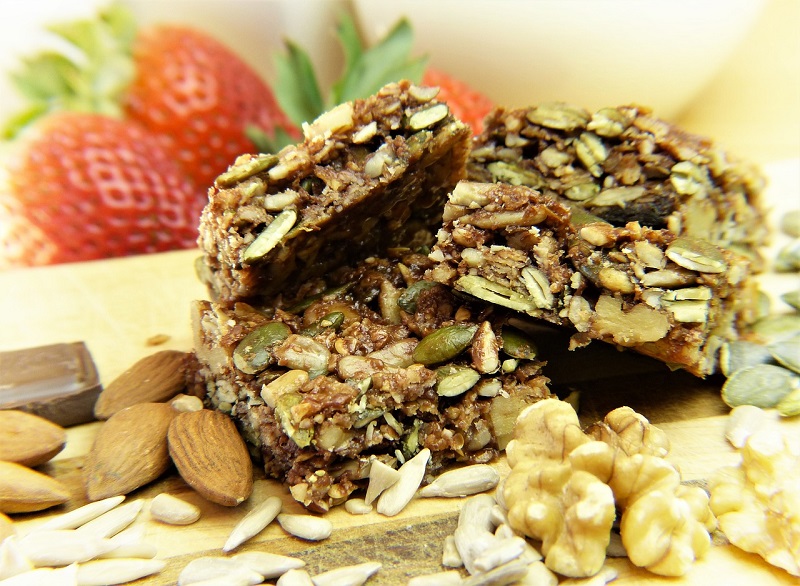
- Brazil nuts
- kidney beans
- sunflower seeds
- tofu
- whole-wheat products
- oatmeal
- brown rice
- chia seeds
- sesame seeds
- tahini
- garlic
- coconut
- amaranth
- barley
- rye
- chickpeas
- pinto beans
- walnuts
Function of selenium in the immune system
Selenium is a mineral that is highly important for the protection of cells against free radicals. These are reactive oxygen species that can wreak havoc throughout the body if not properly regulated.
Although we only require miniscule amounts, selenium is crucial for building powerful antioxidant enzymes to combat the free radicals and prevent cellular degradation.
This function is of the utmost importance when referring to the immune system. Proper dietary selenium intake reduces the risk of cancer and heart disease due to these antioxidant properties.
Selenium also helps to regulate thyroid function, and synthesize DNA. Both of which aid in proper immune function.
The most abundant source of selenium are Brazil nuts. Just half of a single Brazil nut can provide you with your entire day’s worth of this mineral.
Other great sources include beans, whole grains, and other nuts.
Plant foods high in zinc
- oatmeal
- quinoa
- wild rice
- brown rice
- dark chocolate
- sunflower seeds
- walnuts
- beans
- peanuts
- split peas
- lentils
- sesame seeds
- pumpkin seeds
- poppy seeds
- spinach
- garlic
- avocado
- cashews
- Brazil nuts
- almonds
Function of zinc in the immune system
Adequate amounts of zinc are necessary for proper cell division and growth. Not only is zinc important for a healthy immune response, but it is also required for wound healing.
When the body is attacked by foreign invaders such as bacteria or viruses our natural immune defense mechanisms create a large degree of inflammation to ward off the invader.
During this natural defense process the body ends up damaging its own tissues, and thus will ultimately require repairs aided by zinc.
Although zinc is found abundantly in plant foods, food refining and manufacturing processes may reduce or completely remove the available dietary zinc originally found within foods.
Those consuming a diet heavy in refined carbohydrates and fats are at greatest risk of developing a zinc deficiency.
These foods are common in the Standard American Diet, such as sugary sodas, candies, coffee drinks, flour products, oils, commercial breakfast cereals, and packaged snacks.
Zinc deficiencies are commonly reflected by reduced immune system defenses, reduced appetite, diarrhea, and impaired ability to taste.
Immune-boosting recipes
People are increasingly concerned with their natural abilities to combat disease perhaps now more than ever. Try any of the delicious recipes that follow to boost your defenses naturally and without delay.
Pumpkin Spice Banana Oatmeal
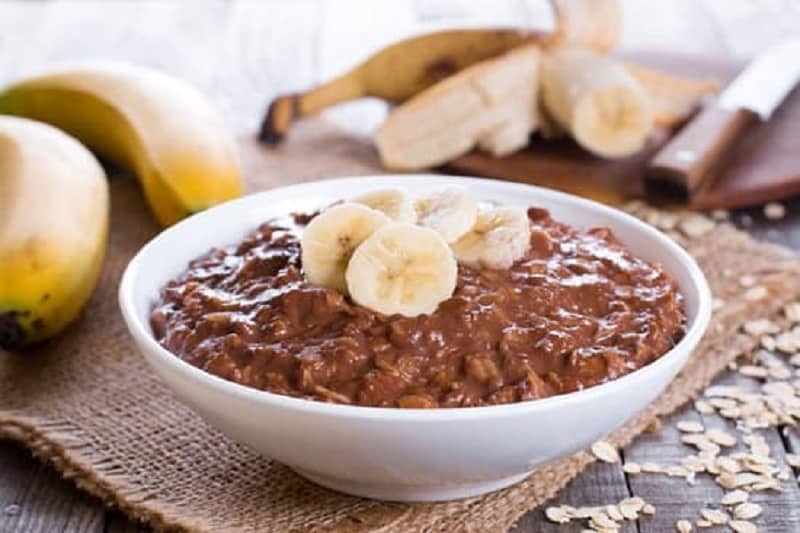
Ingredients
- 1 cup oatmeal
- 1/4 cup pumpkin puree
- 1 oz pumpkin seeds
- 1 oz chia seeds
- 1 oz walnuts
- 2 tsp pumpkin pie spice
- 1 tsp cinnamon
- 1 small banana
- unsweetened dried coconut flakes
Instructions
Prepare your oatmeal. I prefer overnight slow-cooked steel-cut oats or intact-oats using only water, but you are free to use *whatever kind you prefer.
Stir in the pumpkin puree, chia seeds, pumpkin pie spice, and cinammon.
Top with walnuts, pumpkin seeds, banana, and dried coconut flakes.
*Keep in mind the farther you get from whole intact or steel-cut oats the more refined your oats become, and therefore, the less nutrient-rich your oats also become.
Immune-boosting compounds found in Pumpkin-spice Banana Oatmeal recipe
Oatmeal is most nutritious when made from intact whole oats. These are packed with immune system boosters like iron, vitamin C, selenium, zinc, vitamin E, and vitamin A.
Pumpkin is known for its beta-carotene, which readily converts into vitamin A inside the body. Just one cup contains nearly 200% of your daily recommended intake of this immune-supporting vitamin.
Pumpkin seeds are notorious for their high iron content. This tiny seed also holds plenty of zinc, folate, and antioxidants.
Chia seeds and walnuts provide a wonderful nutty flavor, as well as iron, zinc, vitamin E, and folate.
The spices contained in this recipe have been used medicinally for centuries due to their apparent immune fighting properties.
Bananas are a great source of vitamin C, among other health-benefiting components.
And coconut flakes are particularly high in selenium and iron. Ultimately providing over a quarter of your daily value (DV) of selenium, and about 18% of your DV of iron.
Hearty Curry Bean & Vegetable Soup

Ingredients
- 1 large sweet potato
- 1/2 lb dried navy beans
- 1/2 lb dried red lentils
- 1 large red onion
- 8 oz. chopped baby Bella mushrooms
- 1 cup of frozen corn
- 1/2 cup of frozen chopped carrots
- 1/2 cup of frozen chopped green beans
- 1 cup of frozen chopped collard greens
- 1 15 oz can tomato sauce (no salt added)
- 1 15 oz can tomato paste (no salt added)
- 2 tbsp minced garlic
- 3 tbsp curry powder
- 1 tbsp cinnamon
- 1 tsp sweet paprika
- pinch of cayenne pepper
- 2 bay leaves
Instructions
Chop the onion, mushrooms, and sweet potato. Place all the ingredients except the red lentils into a pressure cooker.
Fill the pot with water until all ingredients are nearly submersed.
Seal the lid then place on “soup” setting. And press start.
When the cook time has completed manually release the pressure slowly.
Stir the soup carefully and add the red lentils. Place the lid back on the pressure cooker and seal.
Let it simmer on low heat for approximately 20 minutes. Remove bay leaves.
If you prefer to cook on the stovetop that works well, also. Use the same method of adding all ingredients except the red lentils.
Fill with water then let the mixture boil for about 5 minutes. Simmer for the remaining hour or two depending on how you prefer your soup. The longer the flavors cook together, the more fragrant and blended they become.
Again, add red lentils near the end of cooking and allow to sit for 20 minutes.
This recipe makes 8-10 servings depending upon the size of your ingredients. Freeze leftovers in individual-sized containers.
Immune-boosting compounds found in Hearty Curry Bean & Vegetable Soup recipe
Vegetable soups are an easy go-to for anyone trying to boost their health, and immune system in particular.
You simply throw all your favorite ingredients in a pot and cook it until all the flavors have mixed well and the vegetables are nice and malleable.
The sweet potatoes in this soup recipe are a great source of beta-carotene due to their bright orange hue.
Beta carotene converts to vitamin A in the body which protects the body by building and maintaining the integrity of the skin and other mucus membranes.
As we have already discussed, these are important components of a healthy immune system because they provide the first line of defense from potential invaders.
Navy beans are full of immune-boosting benefits with 1 cup containing 64% of the recommended daily intake (RDI) of folate and nearly a quarter of your recommended RDI for iron. This bean also provides plenty of zinc and vitamin C.
Red lentils are high in folate, iron, and zinc. These are generally used as a meat substitute because they are also extremely high in protein with one cup providing a third of your daily protein needs.
Mushrooms are antioxidant powerhouses known for their abilities to battle cancerous cell growth within the body.
Tomatoes and their many varieties of pastes, sauces, and premade diced versions offer loads of vitamin C, iron, and vitamin A.
The natural acidity of the tomato sauce also leaves a salt-like flavor without having to compromise the health benefits of your soup by adding actual salt.
Chocolate Berry Smoothie Bowl

Ingredients
- 1/2 cup frozen wild blueberries
- 1/2 cup frozen blackberries
- 1/2 cup frozen raspberries
- 1 frozen banana
- 1 cup spinach
- 1 cup almond milk
- 1 tbsp ground flax seeds
- 1 tbsp ground chia seeds
- 2 tbsp cocoa powder
Toppings:
- 1 oz sliced almonds
- 1/4 cup frozen mixed berries
- 1 oz cocao nibs
- 1 oz unsweetened shredded dried coconut
- 1/4 cup oil-free granola
Instructions
Combine the almond milk, ground chia and flax seeds, cocoa powder, and spinach in a high powered blender (vitamix is preferable but not required). Blend on high for 1-2 minutes depending on the blending capacity of the blender.
Add the frozen banana, blueberries, blackberries, and raspberries. Blend on low until you reach a creamy ice cream-like consistency.
Pour into bowl to serve immediately. Top with sliced almonds, granola, frozen berries, cocao nibs, and dried coconut.
Makes 2 servings
Immune-boosting compounds found in Chocolate Berry Smoothie Bowl recipe
Berries are essential for building a healthy immune system. They are the richest source of a number of antioxidants and various phytochemicals.
Berries also contain high amounts of vitamin C. 1 cup of berries provides a quarter of your daily vitamin C requirements.
These tiny fruits also have small amounts of iron which is needed for healthy blood, nutrient, and oxygen supply, as well as detoxification processes.
Spinach is the most versatile tasting green. That is why it becomes the perfect candidate for smoothie and smoothie bowl recipes.
Spinach is packed with folate, vitamin A, C, and E. All of which are necessary for healthy immune function.
Almond milk is also used in this recipe for its versatile and nutty flavor. It contains immune supporting nutrients such as vitamin D, A, and E.
Much of the nutrition in commercial almond milk comes from enriched sources. So nutrient profiles may vary depending upon the brand of milk purchased.
Also be sure to purchase unsweetened versions of commercial milk, or simply make your own by blending soaked almonds and water in a high speed blender.
Added sugar creates inflammation in your cells and nearby tissues. Low grade chronic inflammation can leave you vulnerable to opportunistic bacteria and viral infections.
The cocoa powder and cacao nibs used in this recipe not only provide that sweet chocolaty flavor, but chocolate is also a significant source of antioxidants.
These powerful nutritional compounds help combat the damage induced by inflammatory stress in the body.
Soothing Lemon Ginger Tea
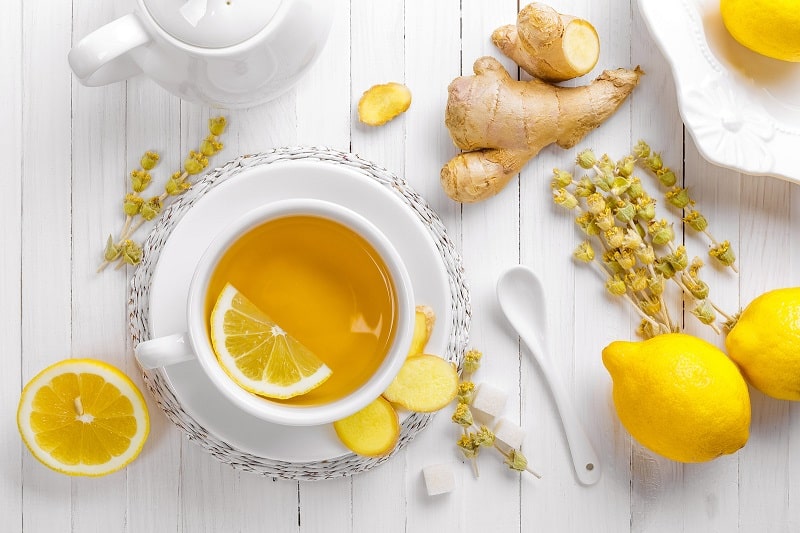
Ingredients
- 3 1-inch pieces of fresh ginger, peeled and sliced into thin rounds
- 4 cups of filtered water
- 3 slices of fresh lemon
- 1 cinnamon stick or 1/4 tsp fresh cinnamon
Instructions
Boil the filtered water.
Peel and slice the ginger pieces finely.
Add the ginger and cinnamon stick to the boiling water.
Strain tea and discard ginger pieces and cinnamon stick if preferred. You may also choose to stir your tea with the stick while you sip it. Or simply add 1/4 tsp of fresh cinnamon.
Serve piping hot with lemon slices.
Immune-boosting compounds found in Soothing Lemon Ginger Tea recipe
Ginger has long been known for its beneficial health effects. It holds many potent anti-inflammatory compounds, including a variety of antioxidants, which are substances that protect your body from damage by unstable molecules called free radicals.
Ginger has been shown to reduce inflammation in people suffering from a number of chronic illnesses such as Type 2 diabetes, rheumatoid arthritis, inflammatory gut disease, asthma, and certain cancers.
Inflammation has been shown to increase your chances of acquiring infectious illnesses such as the common cold, flu, and corona viruses.
Boiling the ginger helps to activate certain compounds contained in ginger root. This allows for greater ease of digestion and absorption.
This root vegetable has also been shown to relieve nausea, stimulate natural detox processes, relieve congestion, and improve blood circulation.
Cinnamon is also a powerful immune simulator. It has been shown to provide other health benefits such as the prevention of blood platelet clumping, the inhibition of inflammatory substances, and blood sugar regulation.
You don’t need much of this powerful spice to reap the health benefits. Just .5 to 2 tsp of cinnamon per day may provide what your body needs.
Lemon is also a great go-to for aiding the body’s prevention and response to illness. Citrus fruits are high in vitamin C. You really can’t receive too much of this important vitamin so pile on the lemon slices.
Tea is also useful for relieving sore throat and upset stomach when you have already been infected by illness.
Garlic Mushroom Quinoa
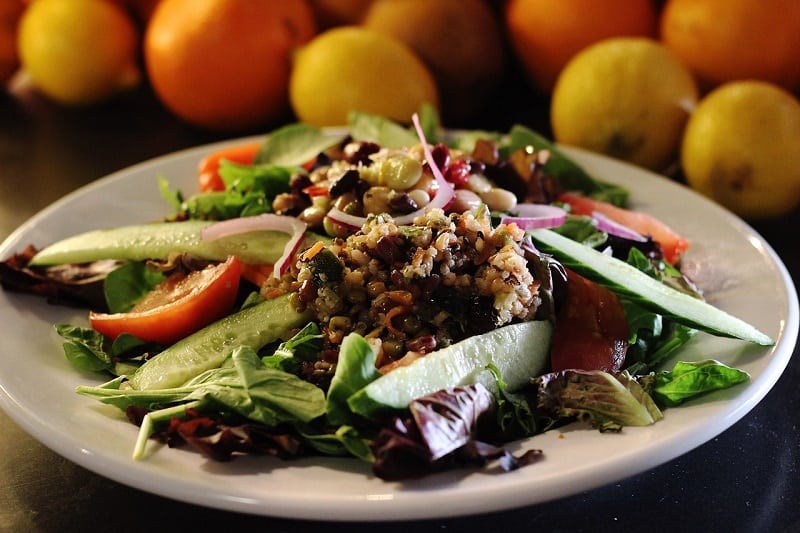
Ingredients
- 4 oz of shiitake mushrooms
- 1 small yellow onion
- 2 tsp minced garlic
- 2 cups cooked quinoa
- 1 tsp turmeric powder
- 1/4 tsp smoked paprika
- pepper to taste
- mixed greens
Instructions
Rinse and cook quinoa according to package. I usually place two cups of water for every one cup of quinoa into the pressure cooker, then cook according to rice setting. You can also cook this on the stovetop.
Saute the mushrooms, and onion with water as needed to keep the food from sticking to the pan. Add the garlic 2-3 minutes prior to removing from heat.
Mix sauteed veggies with quinoa, then add the turmeric powder, paprika, and pepper.
Serve immediately on a bed of fresh greens.
Immune-boosting compounds found in Garlic Mushroom Quinoa recipe
Quinoa is considered a pseudo-grain because it is technically a seed, but used and generalized as a grain.
This extremely versatile pseudograin packs a powerful nutritional punch with about 20% of your daily recommended folate and 15% of your daily iron.
Quinoa also has smaller amounts of zinc, selenium, and vitamin E to help keep your immune defenses in order.
Mushrooms and greens are the most powerful foods for combating aggressive cancer cells. Cooked mushrooms are especially nutritious.
Mushrooms grown in the sunlight are one of the few foods found to have traces of vitamin D.
These are especially important for people living in cold climates where the sun does not reach your skin directly for many months throughout the year.
Greens are a great source of folate, vitamins C, E, and A, iron, and zinc. That’s nearly all the immune-supporting superstars of the nutrition world.
Add greens to as many meals as possible throughout each day and you will significantly reduce your risk for acquiring infectious and noninfectious diseases alike.
Turmeric is one of the most powerful anti-inflammatory foods on the planet. Just a 1/5 teaspoon a day can relieve a number of ailments caused by ongoing, low-grade inflammation in the body.
Cooked onions also have important immune-boosting properties, such as vitamin C, zinc, selenium, iron, and folate. Raw onions have immune-supporting benefits as well.
That’s why it is important to include both cooked and raw onions into your daily meal regimen. (This holds true for greens, also.)
Signs of a compromised immune system

According to researchers at Penn Medicine, you may be suffering from a weakened immune system if you are suffering from any of the following:
- You are over-stressed
- You always have a cold
- You have frequent tummy problems
- Your wounds are slow to heal
- You have frequent infections
- You feel tired all the time
Causes of a weakened immune system
There are 9 well-established causes behind a weakened immune system. All of which can be managed or mitigated on your own, fortunately, by taking necessary steps towards healthier lifestyle choices and habits.
- Smoking
- Sleep deprivation
- Chronic stress (& poor stress management)
- Social isolation
- Lack of exercise
- Exposure to environmental toxins
- Excessive alcohol/drug use
- Vitamin D deficiency
- Diet heavy in salt, sugar, fat, animal foods, and processed foods
This last cause of a compromised immune system is especially pronounced in developed countries where affluent societies have an over-abundance of foods laden with salt, sugar, and fat.
Most people do not place sufficient emphasis on diet when attempting to improve their immune function. But studies consistently reveal that diets high in harmful saturated fats, cholesterol, trans fats, refined plant food particles, (i.e. sugar and flour) preservatives, and other chemical dyes and additives have profound effects on your body’s ability to fight off disease.
On the flip side, eating foods rich in these harmful components are also greatly lacking in disease-fighting properties, such as fiber, phytochemicals, antioxidants, and other micronutrients.
So not only are you damaging your system with foods consistent with the Standard American Diet (SAD), but you are also withholding important components found naturally within whole plant foods.
In case you are unfamiliar with the SAD terminology, I am referring to such foods as pizza, fried chicken, frozen dinners, ice cream, fast food, readily prepared convenience items, protein bars/shakes, commercial breakfast cereals, bagels, pastries, doughnuts, candy, etc.
Basically anything that wasn’t grown in the ground, washed off, and placed directly into your kitchen and on your plate.
The role of chronic inflammation & oxidative stress in immune dysfunction
Inflammation is your body’s first line of defense against toxins, infections and injuries. These are examples of acute inflammation, which are not only natural, but also necessary to defend and repair body tissues.
Chronic inflammation is an ongoing state of inflammation gone awry. This can happen for a number of reasons.
We will focus on the chronic inflammation induced by eating a diet low in fruits, veggies, and other plant foods, and high in animal protein, fat, and processed foods.
Oxidative stress is essentially an imbalance between the production of free radicals and the ability of the body to counteract or detoxify their harmful effects through neutralization by antioxidants.
A whole foods, plant-based diet contains 64-times the amount of immunity-boosting antioxidants compared to a diet that includes meat and dairy.
PlantBasedNews.org
The more antioxidant-lacking foods you remove from your diet the more room you have to replace them with antioxidant-rich plant foods.
The role of micronutrient deficiency in immune dysfunction
Professors at Harvard School of Public Health have noted that those who are malnourished, or those who are deficient in micronutrients tend to be more prone to disease.
Micronutrients are required to carry out normal processes inside the body. These are needed in minute amounts. Some examples include vitamins, minerals, and phytonutrients.
Populations such as the elderly, people in developing countries, and those who eat a narrowed variety of foods are at greatest risk for micronutrient deficiencies.
Our cells require all essential micronutrients to function at full capacity. When you are lacking in nutrients such as vitamin D or magnesium, for instance, your immune system does not have all the essential components it needs to protect you against disease.
The Standard American Diet – along with popular diet trends such as Keto and Paleo – relies on foods such as meat and dairy that are severely lacking in these micronutrients.
Plant-based foods, on the other hand, tend to be extremely high in these essential nutrients that support healthy cell function.
chronic inflammation overtaxes the immune system
Foods that cause an inflammatory response include dairy, highly processed foods, and other animal foods such as beef, pork, chicken, fish, and eggs.
Supplement considerations

Studies have consistently shown that receiving your micronutrients by eating a diet comprised of a variety of whole natural foods is more beneficial than attempting to obtain your nutrients in supplement form.
With that being said, some people still feel the need to take a daily supplement (or several) just to be on the safe side.
Keep in mind, however, that taking large amounts of highly concentrated nutrients may come with unwanted side effects, such as increased cancer risk, or the risk of becoming deficient in certain micronutrients due to an overabundance of others.
There are only so many receptor sites where micronutrients can properly bind inside the body. There is also only so much the body can utilize at one point in time.
The point is, more of a “good thing” is not always better.
Talk to your doctor about specific areas in your daily nutrient profile that could use a boost. Or see a dietitian or nutritionist to come up with a healthier diet plan.
Either one will ensure you are obtaining adequate daily nutrition requirements to help your body fight off disease naturally.
Don’t wait until the next pandemic to get your body in an optimized position to protect you against deadly pathogens.
Start implementing the recipes and strategies found in this article today to reap the powerful health benefits tomorrow.
